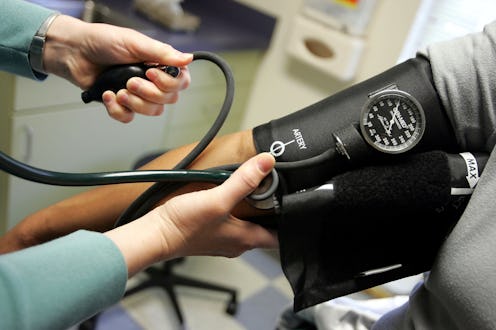Many women suffer from PMS or Premenstrual Syndrome, which is unpleasant enough in and of itself — but to make things worse, apparently it might also be connected to another negative health condition. A new study published in the Journal of Epidemiology found a potential link between PMS and high blood pressure. Cue the sad trombone noise, am I right?
The researchers studied 1,260 women who suffered from severe PMS between the years of 1991 and 2005, as well as 2,400 women who suffered from mild PMS and were tracked until 2011. The study also took into account factors like weight, smoking, a family history of high blood pressure, and alcohol consumption; these factors can all also lead to the development of high blood pressure, so they were definitely worth considering to make sure they didn't skew the results.
The most significant finding was that women who had moderate-to-severe PMS had a 40 percent higher likelihood of developing high blood pressure later in life than those with mild PMS, or those who suffered from none at all. Additionally, the strongest link between PMS and high blood pressure was found in women under 40.
The findings are fairly significant, according to the researcher; Elizabeth Bertone-Johnson, who led the study, said that it produced results that are the first of its kind. "To my knowledge, this is the first large long-term study to suggest that PMS may be related to risk of chronic health conditions in later life," she commented in a release.
The good news is that the study also found that women with moderate-to-severe PMS who took certain measures were able to mitigate the risk of developing high blood pressure. Those who ingested high amounts of the B vitamins thiamine and riboflavin did not have the same risk; furthermore, taking a lot of these vitamins also led to a 25 to 35 percent lower chance of developing PMS in the first place. If you deal with painful PMS on a regular basis, it might be worth getting some foods that contain B vitamins thiamine and riboflavin into your diet (sunflower seeds, navy beans, and asparagus are all good choices); it might help you out both in the short term and in the long term. You can also take them in supplement form, though, just in case asparagus isn't your thing.
Of course, as with any study, there's still plenty we don't know. The researchers found that "clinically significant" PMS affects somewhere between eight and 15 percent of women; however, Dr. Stacey Rosen, Vice President of Women's Health at the Katz Institute for Women's Health in New Hyde Park, NY pointed out that the demographic of the participants was such that the results may not hold for all women. "One important limitation is that the average age of these patients was 27 years — it would be helpful to see if this association persisted in younger women as well," she said. Dr. Deena Adimoolam of the Icahn School of Medicine at Mount Sinai added that she doesn't think women should be "overly concerned" about the potential link between PMS and high blood pressure.
It seems that we'll probably need to see more research done on this subject to really understand how PMS does or does not affect developing high blood pressure. In the meantime, make sure to get more B vitamins in your system if you're suffering from either condition!
Images: Giphy (2)
